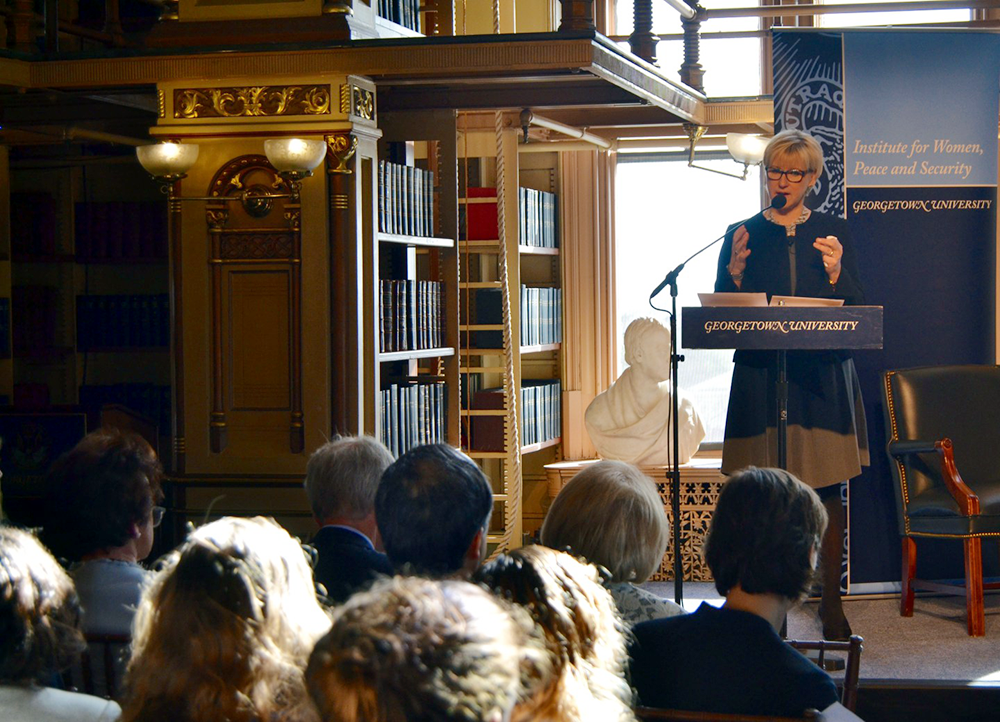
Sweden’s Minister of Foreign Affairs Margot Wallström outlined ways the international community fails to stabilize conflict-prone states during a discussion hosted by the Georgetown Institute for Women, Peace and Security on Thursday in Riggs Library.
GIWPS Executive Director Melanne Verveer moderated the discussion with Wallström and audience members.
Wallström boasts an extensive career in mediating conflicts and empowering women across the globe. In 2010, she was appointed as the United Stations Special Representative on Sexual Violence in Conflict and is one of the chief creators of Sweden’s feminist foreign policy, which ensures gender equality between women and men as a precondition for Sweden’s wider foreign policy objectives.
Following an opening statement from university President John J. DeGioia, Wallström began her remarks by quoting the Swedish diplomat and second-ever UN Secretary General Dag Hammarskjöld on the nature of peace and progress.
“The pursuit of peace and progress cannot end after a few years in either victory or defeat,” Wallström said. “The pursuit of peace and progress, with its trials and its errors, its successes and its setbacks, can never be relaxed and never abandoned.”
Wallström’s address focused on ways the international community fails to address humanitarian crises both before and after they occur. She highlighted the ongoing civil war in Syria as an example where the will of the international community failed to sufficiently address the humanitarian needs of the people.
For Wallström, dealing with conflicts and peace processes personally exposed her to the root causes of countries struggling with rising humanitarian need. From working with countries including Syria and the Democratic Republic of Congo, she argued that such problems must be solved first by redefining the root cause of conflicts and crises.
“The issue of increasing humanitarian needs is not a humanitarian problem. It is political. We desperately need to think boldly on how to address the root causes fueling conflict and find means to support sustainable peace,” Wallström said.
Wallström said if nations and communities are to address the political problems at the root of conflicts, governments and institutions must dedicate themselves to prevention, stabilization and inclusivity when it comes to negotiations and de-escalation.
Wallström said to prevent future instability, negotiators and international actors must ensure all talk of peace is inclusive and core institutions are strengthened in the process. Wallström also said bringing more women to the discussion table can both improve inclusivity and increase the success of most negotiations.
“Recent research demonstrates women’s effective participation substantially increases the likelihood of peace agreements being reached and sustained,” Wallström said. “Yet even today in 2016, we are all too familiar with women being dramatically underrepresented in peace and mediation processes.”
By highlighting the successes made by negotiators in areas ranging from Columbia to Sri Lanka, Wallström praised the efforts of organizations such as the United Nations to bring women into negotiation processes. However, Wallström argued the international community must consistently double its efforts when it comes to bringing women into mediation roles.
“Women must actively participate in all decision-making processes at all levels and be active in defining priorities in times of peace and in times of war. To put it simply: more women, more peace,” Wallström said. “Nothing can be discussed about women without women.”
Verveer and Wallström then discussed the progress of women in international leadership roles. Both commended organizations that vocally assert their commitment to gender equality, including the UN, yet stressed the need to hold organizations accountable to their words.
Verveer attested to her own relationship with women leaders over the course of her service as U.S. Ambassador for Women’s Issues, noting their impact in fragile states. However, she stressed the need for international organizations and governments to continue to promote women as leaders in decision-making.
“When you sit at decision-making tables, if you only see women as victims you do not see them as the real change-makers that they can be,” Verveer said. “We have to recognize the full participation of women in these processes.”
During her closing remarks, Wallström expressed her own commitment to bringing women to the forefront of negotiating roles. She said she hoped the international community will make the necessary strides and efforts to promote inclusivity across genders while being persistent in the progress it has made already.
Marjam Kalle (GRD ’16), who is pursuing a masters in conflict resolution, said she found the minister’s remarks insightful and constructive. Kalle said Wallström’s arguments on bringing women to negotiating tables particularly resonated with her.
“If we look at the way negotiations and diplomacy take place today, how many women do we see leading [them]? Not many,” Kalle said. “If institutions and groups are serious about being inclusive, then they also need to be serious about women taking roles as the leaders they can be.”
Alicia Smit (GRE ’16) praised Wallström for emphasizing the relationship between inclusivity and conflict mediation. She also hoped others in the audience would appreciate the efforts Wallström has made and continues to make in striving for gender equality.
“Minister Wallström is a well-known figure and advocate when it comes to issues of gender equality,” Smit said. “Both her and [Verveer] definitely struck at the significance of what it means to bring women into mediation efforts, and that means recognizing all females as the leaders they can be.”




















